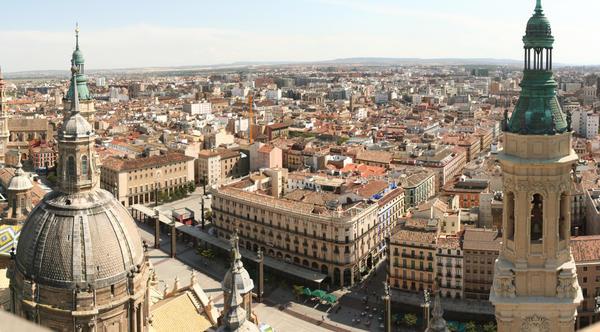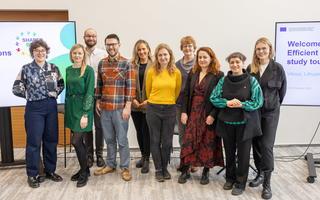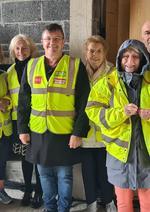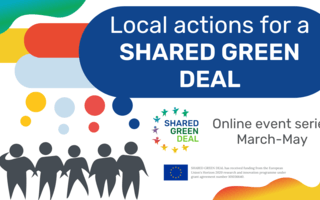Sharing knowledge for efficient renovation of residential buildings in Zaragoza
Summary of the local experiment
In their social experiment, ECODES sought to create a knowledge network including different stakeholders (homeowners, neighbourhoods, tenants’ associations, professionals, public administration, the financial sector, and innovation centres) to assess how to address energy efficiency improvements that do not further overburden low-income households, often living in worst-performing buildings and suffering from energy poverty. The experiment will help to develop a socially-just and energy-efficient renovation strategy considering the feasibility and inclusivity of addressed solutions.
Local context
Zaragoza is a medium-sized city in the Northeast of Spain, densely populated with 667,000 inhabitants. Zaragoza’s residential building stock comprises 326,000 dwellings, 56% built before 1981. The share of social housing is scarce, accounting for less than 1% of the city’s residential stock (the average in Spain is 2.3%, substantially lower than the EU average). Currently, there is no active Local Energy Poverty Action Plan. However, the city’s public housing agency (Zaragoza Vivienda) has developed a plan to invest in energy-efficient renovations until 2030. The experiment will target low-income districts, where multi-apartment blocks (4-storey, 65 m2 on average) built for the working class during the 1960s predominate. Nowadays, residents of these buildings face problems related to low insulation and accessibility barriers.
Specific needs and challenges
The target group consists of low-income neighbourhoods with dwellings usually occupied by either historical owners (mostly retirees receiving insufficient pensions) or by low-income tenants or new owners (mostly single-mother and/or migrant households) who are suffering from poor energy performance issues whilst lacking financial means to renovate their homes. Tenants in energy poverty face specific barriers (time availability, language, technical knowledge) to actively participate in the renovation process. Moreover, in many cases, landlords would most likely increase the rent after a renovation, putting tenants at risk of eviction. Building management and homeowner associations face complex governance and inflexible decision-making structures, while public administrations lack the capacity to manage the volume of subsidies required to meet renovation goals. Additionally, financing mechanisms for shallow renovations (e.g. replacement of windows and inefficient heating equipment) are scarce.
Detailed description of the experiment
The main aim of the experiment was to assess how to address energy efficiency improvements without further overburdening low-income households, who often live in the worst-performing buildings and suffer from energy poverty. The building stock in Zaragoza urgently needed renovation to meet energy performance goals. To address the various needs and challenges that renovating multi-apartment buildings entails, the Knowledge Network members sought to explore feasible solutions such as tailored financing schemes, revised subsidy award procedures and criteria, and the creation of renewable energy communities (RECs) in collaboration with local authorities.
The experiment fostered the community’s motivation to act by creating a learning environment that promoted change and provided know-how and skills related to the social, economic and technical challenges that efficient renovation entails. The activities of the Knowledge Network formed a multi-stakeholder coalition in which policymakers, businesses and citizens aligned on the importance of building renovation, jointly analysed local needs and barriers, and identified the best solutions to tackle them. This collaborative alliance aimed to help policymakers understand the problems with the current system and their critical role in shifting policies and priorities accordingly, to establish more robust mechanisms that enable communities — particularly vulnerable households — to participate in policy-making processes, and to bring all stakeholders into alignment on energy efficiency pathways.
Local engagement
ECODES identified two main collectives affected by energy poverty: single-mother households and retired couples or individuals receiving the minimum pension. However, migrants, ethnic minorities (such as Roma people), and families with persons with disabilities are also in a vulnerable position. The experiment was to foster the inclusion of these target groups by reckoning with their particularities and addressing their specific challenges, assisting them both from a social and technical side. This included addressing, for example, the digital division affecting predominantly elderly households, time constraints for single-mother households or language barriers that might hinder the participation of migrant groups. To overcome these barriers, meetings and visits were to be conducted in person, avoiding virtual interaction, with flexible schedules adaptable to those with less time to spare.
Partners
ECODES - FUNDACION ECOLOGÍA Y DESARROLLO is a Spanish non-profit and independent organisation founded that works to bring together the three pillars of change (public bodies, private sector and civil society) to accelerate the transition towards a carbon neutral, inclusive, responsible and circular economy. Its Energy and People Area, in charge of the local experiment, promotes clean and affordable energy for everyone, focusing on citizens so that they have an active role in the transition towards a decarbonised, equitable and fair energy model. In the social experiment, ECODES will work closely with the local and regional authorities (such as the Zaragoza Company for Housing Renovation and Urban Regeneration- Zaragoza Vivienda and the Housing and Renovation Area of the Aragon Regional Government), the financial sector, Small and Medium-sized Enterprises (SME) in the renovation, construction and green energy sectors, and civil society organisations and neighbourhood associations working with residents at risk of energy poverty.
Local partner
ECODES - FUNDACIÓN ECOLOGÍA Y DESARROLLO
Country
Spain
Number of inhabitants
667,000
City
Zaragoza
Website/social media
Contact person:
Cecilia Foronda, Energy and People Directorcecilia [dot] foronda [at] ecodes [dot] org
May-Jun 2023
Recruitment of network members: initial contact with stakeholders
Jul-Aug 2023
Establishing the local knowledge network: participatory mapping
Sep 2023-Jan 2024
Observation stage: site visits with thematic workshops
Feb-Mar 2024
Reaching out and scaling up stage: Connection Lab session
Apr-Early May 2024
Reflections and next steps: working session on results
Related Green Deal Priorities
TIMELINE
Case Study Guides
|
Find out more


CONTACT
For further details please contact co-leads Professor Chris Foulds (chris.foulds@aru.ac.uk) and Professor Rosie Robison (rosie.robison@aru.ac.uk).

This project has received funding from the European Union’s Horizon 2020 research and innovation program under grant agreement No 101036640. The sole responsibility for the content of this website lies with the SHARED GREEN DEAL HAS project and does not necessarily reflect the opinion of the European Union.







